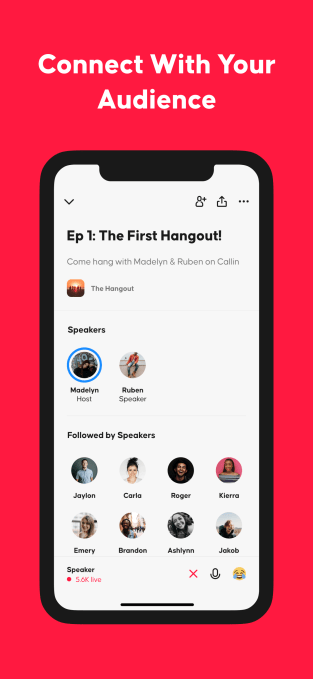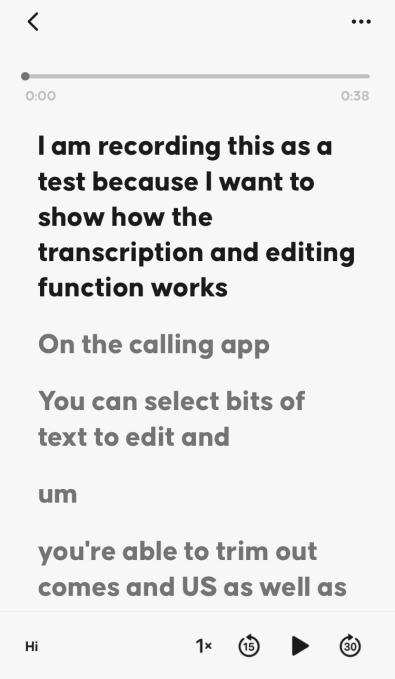As live audio becomes more and more popular, co-founders David Sacks (former COO of PayPal and CEO of Yammer) and Axel Ericsson sought to combine social audio and podcasting into one seamless app. The resulting app Callin launches today on iOS with an announcement of $12 million in Series A funding co-led by Sequoia, Goldcrest, and Craft Ventures, where Sacks is a founder and partner.
On live audio platforms like Clubhouse or Twitter Spaces, once a room ends, the audio is gone. While Callin has similar live audio functionality, it sets itself apart by allowing users to save their live recording and edit it into an episode of a podcast.
“I’d been meaning to do a podcast for years, and I just had never gotten around to it, because it’s too complicated, and the barriers are too high,” said Sacks, who started his “All In” podcast in lockdown. “We have a guy in the studio who spends six hours doing post-production on every episode of the pod, and we all had to get microphones, hardware… It’s complicated to organize.”
For aspiring podcasters creating their first shows, Callin reduces the barrier to entry while allowing users to retain ownership of the content they create on the app. To start recording, users just open a room, which can be private or public — then they can invite guests to talk with them, or record alone. In a live room, Callin also has a more streamlined queue for audience participation to make it easier for hosts to manage crowds.

To edit your podcast after recording, the app generates a transcript — it takes about the same amount of time as your recording to transcribe. Then, you can tap a block of text to cut it from the podcast, including isolated filler words, like um and uh. As of now, you can’t cut individual words or phrases within each block of text identified by the AI, but Sacks says that the app will continue building out its editing system. Callin also automates the process of cutting out “dead air” at the beginning or end of a recording. After finishing edits, the host can upload the recording as an episode of a show that they create on the app. Users can also export their audio to share it on other podcasts hosts, and in the future, Sacks said users will be able to syndicate the content via an RSS feed.
“But consuming that content via a podcast app would be different from experiencing it on Callin, because you have the interactive playback to see the room as it was when the conversation occurred,” said Sacks. “So you can see the avatar of who’s talking and you can click it and follow them or browse their profile to see what else they’re interested in, so it’s a different experience than just a flat audio file.”
Image Credits: Callin, screenshot by TechCrunch
Podcasters cannot yet publish their transcripts — which, like most automated transcripts, aren’t 100% accurate — but that functionality, which Callin is working on, could create some much-needed accessibility that’s still lacking on Clubhouse. Like Clubhouse, Callin doesn’t support live captioning yet (Twitter Spaces does). But Sacks said that once it expands to allow hosts to share transcripts, live captioning would “be on the roadmap.”
“There are apps out there that do rooms, there’s apps that let you edit transcripts, and there’s apps that do social discovery or highlights, but nobody’s really put all these pieces together into one experience,” Sacks said. “So we’re trying to be this complete vertical stack for anyone who wants to create an audio show, and so I think you’ll see us keep iterating on every aspect of that experience. We want there to be nothing you can do in a podcasting studio that you can’t do on our app.”
Still, in its current form as it launches into the App Store, Callin lacks tools to edit the quality of an audio recording, add sound effects or music, and edit content in a more precise way. Plus, a podcast recorded on an iPhone won’t sound as good as a professionally produced show, or even a hobbyist’s podcast recorded on a consumer-grade USB mic. But the success of live audio apps has shown that sometimes listeners aren’t looking for quality post-production and sound design, but rather, they just want to hear people talk about a subject that interests them. So, Callin and its investors are betting on the fact that people would want to listen to pre-recorded Clubhouse rooms if they could.
Sacks has used his app to create shows like “Sacks on SaaS,” a show for software company founders, and an interview show called “Red Pills,” which is titled with a phrase that has a very fraught history on the internet. Other user-made content on the app includes shows about the NFL, startups in Berlin, cooking, and more. In its beta, Sacks says that Callin had “thousands” of users who created over 100 shows.
Per its Community Guidelines, Callin “is a place for people to speak, so whenever speech is limited on our platform, there should be a good reason.” Callin will only limit speech restricted by the host of a room, speech restricted by “underlying technology platforms” like Apple and Google, and “dangerous speech not protected by the First Amendment.”
Content moderation has been a challenge on live audio platforms like Clubhouse, which has struggled to refine its content moderation standards after reports of racist and antisemitic speech. Callin’s Community Guidelines indicate that it will host any user-generated content that won’t get the app booted off of Apple and Google stores. Recently, Parler served as a high-profile example of how a social platform’s refusal to moderate content got it removed from app stores, though it has since been reinstated after months of back-and-forth.
With its $12 million Series A round, Callin hopes to support Android and web versions of the app. Eventually, Callin could seek profit through advertisements and show subscriptions, but Sacks says that the company plans to scale first before exploring its monetization options.
“I think this is the best product that I’ve ever worked on,” said Sacks. “I mean, I think it’s better than Yammer. I think it’s better even than PayPal.”














